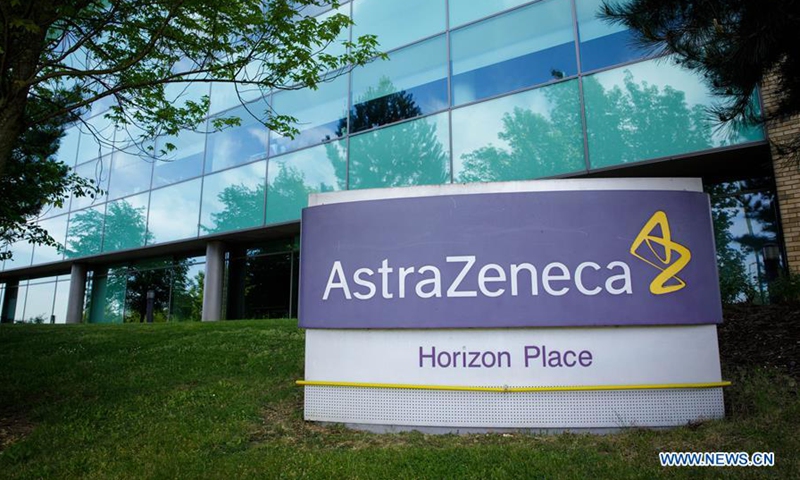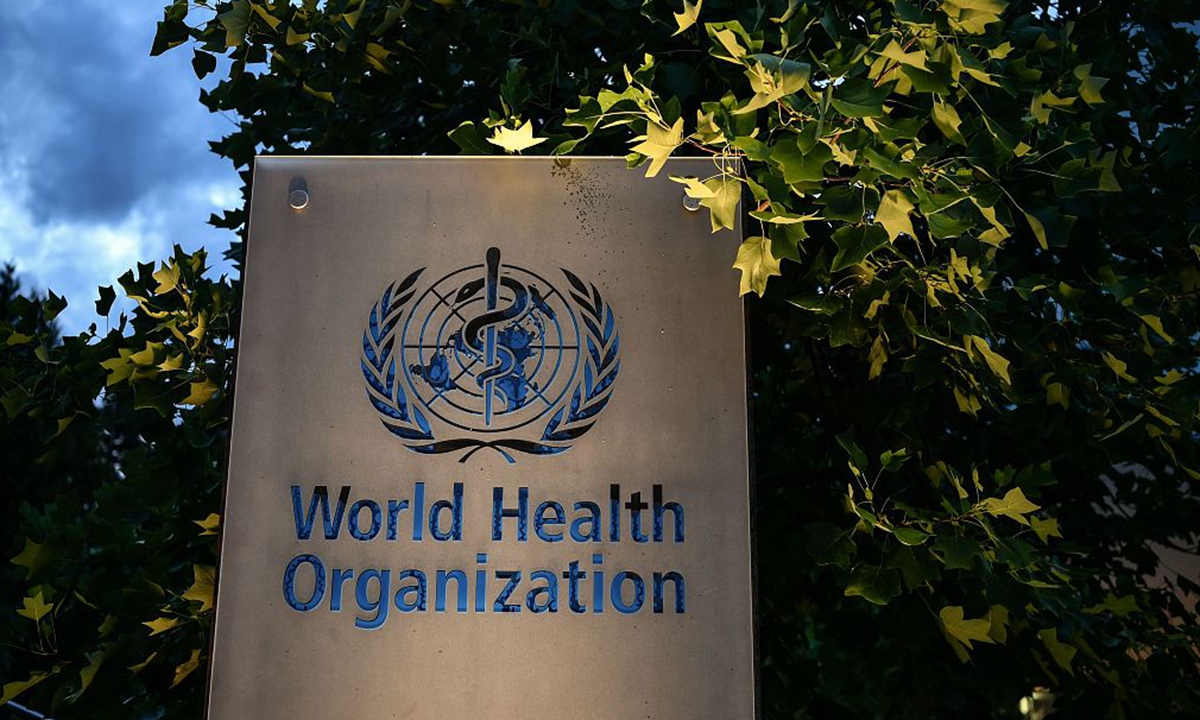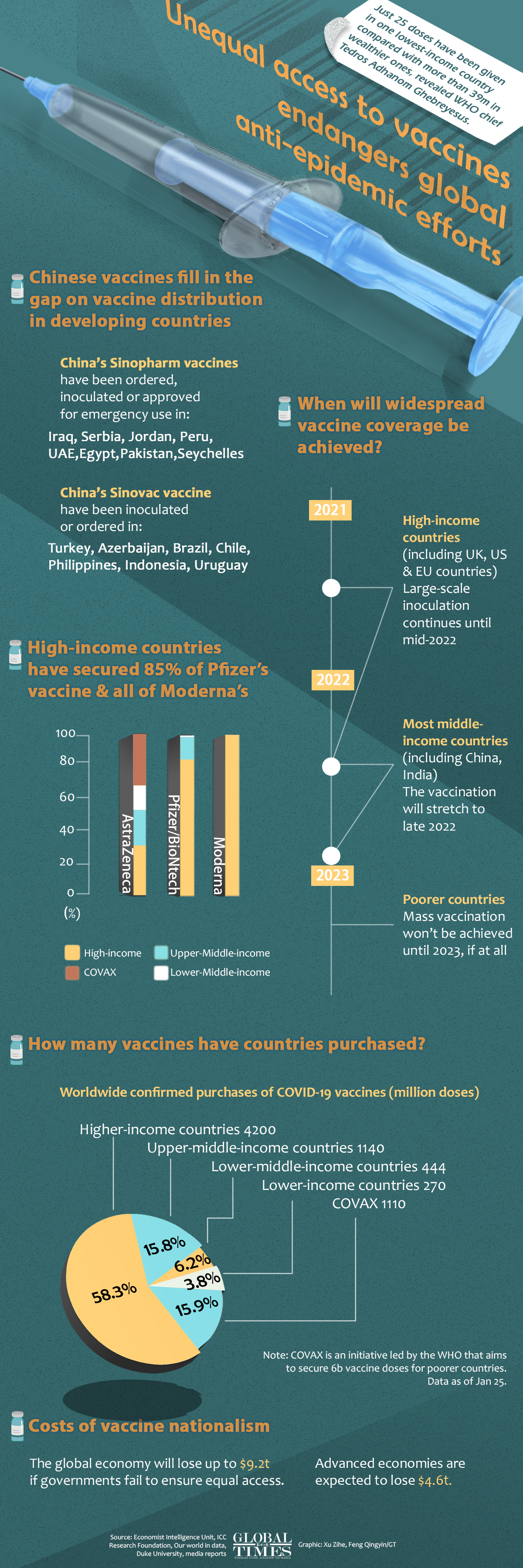
Photo taken on May 18, 2020 shows a logo in front of AstraZeneca's building in Luton, Britain. AstraZeneca, which is developing a possible vaccine against COVID-19 in partnership with the University of Oxford, on Wednesday put on hold the phase-3 trial of its vaccine following an unexplained illness in one trial participant in Britain. (Photo by Tim Ireland/Xinhua)
Rich countries have been accused of “modern piracy” after reportedly using diverse tactics to source life-saving COVID-19 vaccines. Recent quarrels over scarce vaccines bring back memories of the wrestle for life-saving masks in the early stage of the outbreaks last year. Practices such as outbidding other countries to secure timely purchases in the increasingly intense global market seemingly remind us of how great powers hoarded supplies and looted resources during the colonial age.
AstraZeneca on Wednesday refuted the EU’s assertion that they failed to make good on their promises, arguing that the contract figures with the EU were targets, not commitments. Brussels and London tossed threats and accusations against each other at the virtual Davos Agenda 2021 summit on Tuesday after AstraZeneca reduced its promised supply numbers due to production limits.
Despite calling for more, some developed countries have reserved doses that far outnumber their populations whereas many poorer countries are suffering from huge shortages.
Experts warned of a fueled gap in vaccine accessibility, urging rich states that are jostling for early jabs to share, not hoard.
Economists alerted that unfair distribution may bring a new round of economic crises which will hit developing countries hard if not managed appropriately.
They warned the "me-first" mindset of some countries may see hiked vaccine prices and encourage hoarding, feeding the black market.
“With vaccine supply still very limited amid a soaring wave of new infections, an equitable distribution of COVID-19 treatment is not possible in the near term. As supply constraints start to ease, this should, however, be an important objective for the rich, advanced nations in the second half of 2021,” Stephen Roach, a senior fellow at Yale University's Jackson Institute for Global Affairs, told the Global Times on Tuesday.
Widened gap
Some EU leaders have previously accused AstraZeneca of prioritizing the more costly vaccine to countries outside the EU. Similarly, delays in US giant Pfizer's vaccine shipments have frustrated and angered Europe and Canada, despite being among the most secure countries regarding vaccine preorders.
Rich nations including the US and its allies – Israel, Canada and Britain – remain at the front of the queue for vaccines.
The Global Times noticed that high-income countries have secured at least 85 percent of frontier producer Pfizer's vaccine and all of Moderna's.
The EU has ordered enough doses to vaccinate its people 2.8 times, and Canada has about five times more than it needs if each person needs two doses, according to a Global Times calculation on vaccine contracts tracked by Duke University.
The US has snapped up 2,600 million doses, nearly a quarter of the world's supply so far - to cover 396 percent of its population.
"The high-income countries have come to the front of the line and cleared the shelves," the New York Times reported citing Andrea Taylor, a Duke researcher who is studying the contracts.
The US' means of achieving "priority" are well understood - to finance vaccine R&D of the most promising manufacturers from the outset. The US was given priority in vaccine accessibility.
South African President Cyril Ramaphosa lashed out at "vaccine nationalism," accusing rich nations of bulk-buying vaccines and urged them to release excess doses for poorer nations, warning that unfair distribution will prolong the COVID-19 crisis, according to discussions at a Davos meeting on Tuesday.
He said the best way to do that was to vaccinate some people in all countries rather than all people in some countries.
South Africa is one of those left behind, facing domestic criticism for failing to grab the shots. Some other African countries have not sourced any doses based on the reports.
WHO Director General Tedros Adhanom Ghebreyesus said over 39 million vaccine doses had been given to 49 richer states - but there is one poor nation that has received only 25 doses.
Observers warned that uneven distribution may lead to some countries suffering disruptive supply chains and a stagnating economy, while others with doses recover quickly, causing a widening of the economic gap.
"Pandemics are global in nature, and a failure to mitigate the disease in poor countries will prolong the spread and do additional grave damage to more advanced economies," Roach said.
At least four African countries have given its citizens Chinese vaccines or secured vaccines from Chinese developers as of Tuesday, with talks on cooperation underway in more countries. Despite the challenges involved, observers noted that China is striving to help the continent fill the immunity gap rather than hoard doses.
So far, none of the main Western vaccines have been administered in Africa, almost two months after the first doses were rolled out in Europe, the BBC reported.
"Considering the billions of doses needed, and the risk of falling at the back of a very long line for Western vaccines, the appeal of the Chinese vaccines is apparent," Taimur Baig, chief economist and managing director at DBS Group Research, told the Global Times on Wednesday.

Doses of the Oxford University/AstraZeneca Covid-19 vaccine are logged by a technical officer after they arrive at the Princess Royal Hospital in Haywards Heath on January 2 in West Sussex, the UK. Photo: VCG
Gray channels emergeThe gap was widening not only between countries, but also in domestic markets. Media reported that the rich and privileged can skip the line for COVID-19 vaccines, quite like the scenarios of how wealthy and well-connected Americans can access preferential treatment and the best medical resources throughout the pandemic.
Nefarious procurement and black markets are appearing amid such short supply across many countries.
Pfizer and Moderna's vaccines sell at staggering prices on the dark web, media reported. Japanese media also revealed that vaccines from China's Sinopharm were illegally smuggled into Japan for local dignitaries.
As the fight for vaccines heat up, dark methods and scalpers emerge.
A source close to Chinese vaccine producer Sinopharm told the Global Times that overseas purchasers had attempted to approach employees of Sinopharm's subsidiaries, asking them to help with vaccine procurement at a price per dose three times the normal.
The source said such scalpers are also common in the vaccine industry in many other countries including in Southeast Asia and the Middle East.

WHO Photo:VCG
Appeal for multilateralism
The WHO has urged for an end to bilateral vaccine deals, saying the world faces a "catastrophic moral failure" because of unequal COVID-19 vaccine policies. Tedros called for a full commitment to the global vaccine-sharing mechanism COVAX, which is scheduled to start small-scale deliveries in February.
The Gavi, a COVAX coordinator said it had raised $6 billion of the $7 billion that it has sought in 2021 to help finance deliveries to 92 developing nations.
Three leading Chinese manufacturers - Sinovac, Sinopharm and CanSinoBio - have submitted applications to join the COVAX plan. A representative of Sinovac told the Global Times that the application process needs time as the WHO has to first inspect the firm's vaccine production line, and go through a rigorous review and assessment before getting the WHO's prequalification, as requested by the WHO's Emergency Use List (EUL).
Industry insiders told the Global Times that COVAX's funding and vaccine shortage remains a concern, as many of the pre-ordered vaccines may not arrive on time.
One of China's mainstream vaccine producers which preferred not to be named, told the Global Times that bilateral orders of COVID-19 vaccines still dominate, not through COVAX, as they wish for quicker access. But China's vaccine export rules require government approval, leaving much of the demand not yet satisfied.
Feng Duojia, president of the China Vaccine Industry Association, noted that currently the most urgent problem is a shortage of vaccines, if not unfair allocation.
So far, confirmed global purchases cover 7.2 billion doses, with another 5.2 billion doses currently under negotiation or reserved as optional expansions of existing deals as of Monday, according to data released by Duke University.
The world may need about 10 billion doses of COVID-19 vaccines. As global producers go into full production, the demand may be met by the end of 2021, Feng predicted.
Tao Lina, a Shanghai-based vaccine expert, said that the WHO should consider drafting guidelines on doses by quantity for each country based on their population, and guide them to share excess vaccines with poorer countries. "Unfortunately, the WHO is an agency that provides professional advice, not mandatory oversight."
"It is not necessary for a country to buy so many doses at once as it will take months to administer them, the vaccines will sit stockpiled, while other countries struggle to procure their first shots for even key groups, Tao said.

16% of the world’s population has reserved 60% of the world’s vaccines. How will unequal access to vaccines affect the global economy and delay the end of the pandemic? Graphic: Xu Zihe, Feng Qingyin/GT
Global Times

